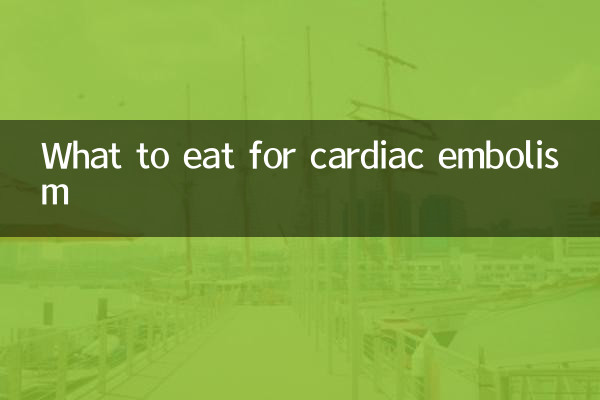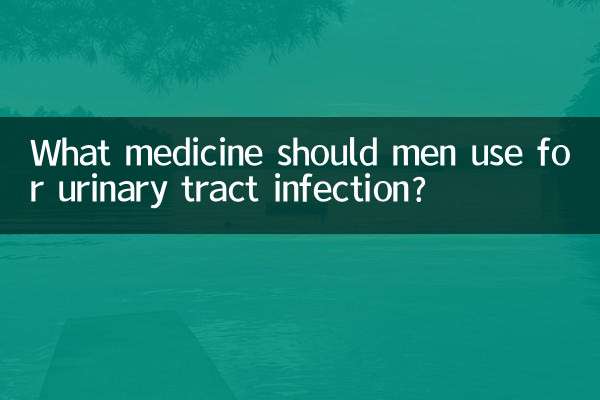What to eat for cardiac embolism: scientific diet helps cardiovascular health
In recent years, the incidence of cardiovascular diseases such as cardiac embolism has increased year by year, becoming one of the important diseases threatening human health. A reasonable dietary structure can effectively prevent and assist in the treatment of cardiac embolism. This article will combine the hot health topics on the Internet in the past 10 days to recommend foods suitable for patients with cardiac embolism and provide structured data reference.
1. Dietary principles for patients with cardiac embolism

The diet of patients with cardiac embolism should be mainly low-fat, low-salt, high-fiber, and rich in antioxidants. Here are the core dietary recommendations:
| dietary principles | specific suggestions |
|---|---|
| low fat diet | Reduce animal fat intake and choose healthy oils such as olive oil and flaxseed oil |
| low salt diet | Daily salt intake should not exceed 5 grams and avoid pickled foods |
| high fiber diet | Eat more whole grains, vegetables, and fruits to promote cholesterol metabolism |
| Rich in antioxidants | Consume dark vegetables, berries, etc. to reduce oxidative damage to blood vessels |
2. Recommended food list
According to recent medical research and nutritional recommendations, the following foods are particularly beneficial for patients with cardiac embolism:
| food category | Recommended food | Benefits |
|---|---|---|
| fish | Salmon, sardines, cod | Rich in Omega-3 fatty acids, reducing the risk of blood clots |
| nuts | Walnuts, almonds, flax seeds | Provides healthy fats and plant sterols |
| vegetables | spinach, broccoli, carrots | Rich in potassium, magnesium and dietary fiber |
| fruit | Blueberries, pomegranates, citrus | Antioxidant, improve blood vessel elasticity |
| whole grains | Oats, brown rice, whole wheat bread | Stabilize blood sugar and lower cholesterol |
3. Recent hot health topics and heart health
Combined with the health hot spots on the Internet in the past 10 days, the following topics are closely related to cardioembolism diet:
| hot topics | core ideas |
|---|---|
| New study on Mediterranean diet | Olive oil + nuts combination may reduce cardiovascular risk by 30% |
| Superfood List Update | Chia seeds and turmeric selected as best heart-protecting foods |
| Intermittent fasting controversy | Proper fasting may improve blood lipids, but requires medical guidance |
| Plant protein trend | Soy protein can replace part of meat to reduce arteriosclerosis |
4. Example of a one-day meal plan
The following is a daily diet plan for patients with cardiac embolism:
| Meals | Recommended menu |
|---|---|
| breakfast | Oatmeal + walnuts + blueberries, green tea |
| lunch | Brown rice + steamed salmon + garlic broccoli |
| Extra meal | Almond + Pomegranate |
| dinner | Quinoa Salad + Chickpeas + Spinach |
5. Foods to avoid
Patients with cardiac embolism should strictly limit their intake of the following foods:
| food category | Specific examples | Hazard |
|---|---|---|
| High salt food | Pickled products, instant noodles, potato chips | Raise blood pressure and increase heart burden |
| trans fat | Margarine, fried foods | promote atherosclerosis |
| High sugar foods | Sugary drinks, cakes | Leads to obesity and insulin resistance |
| processed meat | sausage, bacon | Contains high amounts of preservatives and saturated fat |
Conclusion
Scientific dietary management is an important measure to prevent and improve cardiac embolism. By choosing foods rich in unsaturated fatty acids, antioxidants and dietary fiber, avoiding high-salt, high-sugar, and high-fat foods, coupled with appropriate exercise and regular work and rest, cardiovascular health can be effectively protected. It is recommended that patients develop a personalized diet plan under the guidance of doctors and nutritionists, and regularly monitor blood lipids and blood pressure indicators.
Note: The content of this article combines the latest research results of the recent medical journal "Circulation", updates to the WHO dietary guidelines, and hot topics on health topics on social platforms. The data is as of October 2023.

check the details

check the details